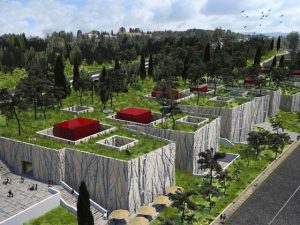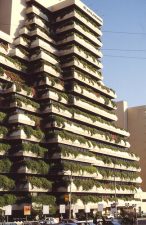 This should be the scene of a brand-new prefab building made in the UAE, but the building is still sitting in an Essex container port.
This should be the scene of a brand-new prefab building made in the UAE, but the building is still sitting in an Essex container port.
The UAE is well-known for its ginormous skyscrapers and oil-guzzling lifestyle, and increasingly Abu Dhabi is making a name for its eco-consciousness, but it can’t be said that our Gulf friends are the go-to people for eco-friendly buildings.
Which is why the UK paper this is Leicestershire has grabbed the following story by its rather slippery horns. Why, they wonder, would the Rutland Primary Care Trust spend £2.3 million on a building made in the UK, rather than one from Europe, and why, six months after its expected installation, is that building still at the Essex container port? En route from the UAE Modcon factory to St. Luke’s Hospital in Market Harborough, where it would have been the new day case unit, the mysterious building became “cosmetically” damaged. Despite earnest efforts by its journalists, the paper was somewhat unsuccessful at getting the Trust to provide succinct details.
In the meantime, £2.3 million of taxpayer money is potentially in pieces. Because of the lack of answers, the paper began to ask a series of other questions.
Why, for example, award the bid to a company in the Middle East when local builders are starved for work?
Roger Crundwell, a partner for Tuke Manton, a London-based architects’ firm which has designed prefabricated units for several private hospitals, told the paper he had never heard of anyone “going that far for one of those before.”
He added that normally these things come from Europe. Germany is said to construct eco-friendly prefab buildings with a speed, tolerance, and reliability that makes them, not the Middle East, the first choice.
Professor David Dernie, head of De Montfort University‘s school of architecture, has a different perspective. He explains that prefab building has come a long way, but that Britain has not caught up. This may explain why local construction companies were not commissioned, though the UAE still seems too far to make the shipping worthwhile.
The Trust insists that the company (which was not available for comment) won the bid through a competitive tendering process that complies with the stiffest European Union procurement legislation. Even so, there are signs that perhaps this was not the best building for the job.
According to this is Leicestershire:
The unit wasn’t going to meet privacy regulations and the contamination area had to be “improved”. Modifications had to be made, which led to the delay. Was that down to a flaw in the design brief, a cock-up on Modcon’s part or new legislation overtaking the plans? We don’t know. We asked the trust whether any of its staff or any of its external advisers had been to see any examples of Modcon’s work first hand. A press officer said that could only be answered as a Freedom of Information request – which can take up to a month to turn around. She didn’t have that information to hand, she said, and didn’t have time to find it.
While the paper may be blowing the story out of proportion, it is worthwhile to consider how globalization enables trade between distant nations and the subsequent environmental impact. A European building may not have been cheaper, economically, but certainly a considerable swath of emissions may have been saved on the shipping bill.
Now taxpayers are lumped with an expensive broken building; and getting the UAE to pay could be a tricky thing to do.
More on green building techniques in the Middle East:
Abu Dhabi To Achieve All Five Green Building Pearls
Learn Permaculture & Green Building Techniques in Israel
Jordan’s Princess Samaya Praises Kingdom’s First LEED Building




Comments are closed.